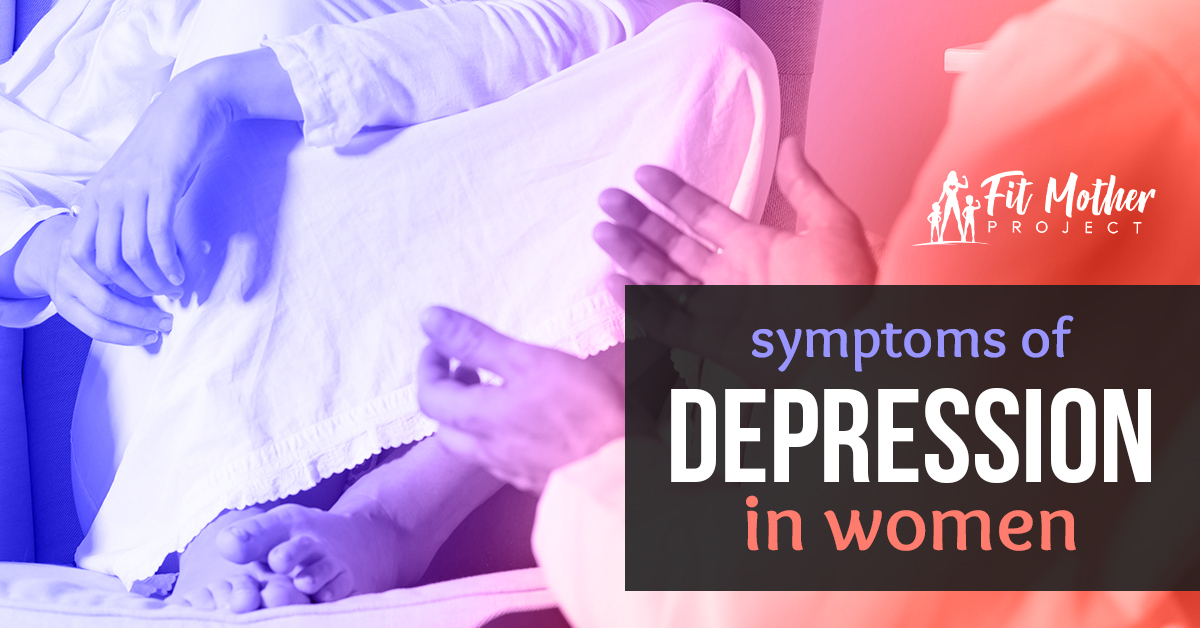Many women suffer from depression, and a lot of those women aren't even aware of the symptoms of depression in women.
Depression affects more American women than you may think.
In fact, of the estimated 16.2 million adults in the U.S. with major depressive episodes, the prevalence is higher among women than men.
The National Institute of Mental Health reports that 8.5% of adult women in the U.S. have had at least one major depressive episode vs. just 4.8% of men.
The Mayo Clinic confirms that women are twice as likely to be depressed as men.
But, if you know the symptoms of depression in women, you can avoid or overcome it!
Here's how.
Causes of Depression in Women
Why are more women than men depressed in the U.S.?
It’s hard to say for sure, but hormone fluctuations and environmental factors likely play roles.
For example, the Mayo Clinic suggests the higher prevalence of depression in women may be related to:
- Premenstrual syndrome symptoms (PMS)
- Pregnancy symptoms
- Post-partum depression
- Perimenopause
- Menopause
- Sexual or physical abuse
- Work overload
- Death of a loved one
- Job loss
- Divorce
- Chronic health conditions
- Stress
- Anxiety
- Post-traumatic stress
- Genetic factors
Regardless of what’s causing depression in women, knowing the symptoms of depression in women and how to fight them is crucial to maximizing mental and physical well being.
These 5 quarantine stress relief techniques will help you get through any difficult time.
How Depression Affects Your Life
Being depressed affects you and others around you.
It can cause problems in family relationships (especially with your spouse and children), your job, and close friendships.
Feeling depressed makes even getting out of bed each morning seem like a chore. Your health takes a toll as well.
The Anxiety and Depression Association of America says depression is the leading cause of disability in U.S. adults ages 15 to 44.
Depression is linked with drug and alcohol abuse, weight gain, and eating disorders in women.
Learn why a lack of support can make it much harder to achieve your goals.
Symptoms Of Depression In Women
The signs and symptoms of depression in women are similar to signs of depression in men.
If you or a loved one experiences the symptoms of depression below, talk with your doctor about possible treatment options.
Ongoing Sadness, Hopelessness, or Guilt
Everybody feels sad now and then, especially during stressful life events — such as a death in the family, job loss, divorce, or other traumatic experiences.
But if the sadness, or empty feeling, you have lasts more than a few weeks and affects your daily life, job, or relationships, it’s time to check in with your doctor about options.
Loss Of Interest In Favorite Activities
If your favorite activities — such as spending time with your children, going on vacation, shopping, or spending time with friends — no longer interest you, you may be depressed.
Desiring to stay in and watch movies in your pajamas is perfectly fine, but never leaving the house is cause for concern.
Trouble Sleeping
Women have trouble sleeping from time to time due to hormonal changes, stress, anxiety, or sleep apnea.
However, if you’re not sleeping well on a regular basis and experience frequent sadness, depression may be to blame.
You may have difficulty falling asleep, staying asleep, or even getting too much sleep when depression lurks.
Learn how to improve your sleeping habits, helping you to wake up feeling well-rested in the morning.
Fatigue
Being depressed often leads to fatigue, even when you’re getting plenty of sleep and are otherwise healthy.
You might feel too tired to get out of bed in the morning, even when you sleep more than 7 or 8 hours each night.
Fatigue may prevent you from spending time with your kids, working out, and keeping up with housework or yard work.
You might talk or move slower than usual when depression kicks in.
Chat with your doctor to determine if depression or another health problem is causing extreme tiredness in your life.
Difficulty Concentrating
Another one of the symptoms of depression in women is having problems concentrating and remembering things.
This can happen with hormonal fluctuations as well, or even as a normal part of the aging process.
You may feel restless or have trouble sitting still when you’re depressed.
Difficulty focusing isn’t a surefire sign of depression, but if this symptom is paired with other symptoms of depression in women seek your doctor’s expert advice.
Appetite Or Weight Changes
When you’re depressed, you might experience changes in appetite and lose or gain weight unintentionally.
Many depressed women eat less or eat more when they’re feeling down in the dumps.
If unwanted weight gain results from chronic sadness, feelings of depression may worsen.
Weight loss may be a welcomed symptom of depression if you’re overweight, but being underweight and malnourished is dangerous as well.
What is a good rate of weight loss per week? Find out the ideal and average weight loss per week for women.
Irritability
Hormonal fluctuations may cause irritability, but depression can too.
If your friends and family say you’re irritable on a regular basis and you have other signs or symptoms of depression, check in with your doctor about your options.
A Pessimistic Attitude
If you’re always down in the dumps, have a negative attitude regularly, or your friends and family members call you a pessimist, depression may be to blame.
Nobody expects you to be an optimist at all times, but if you’re more negative than usual and you experience other symptoms of depression, ask your doctor if natural remedies, counseling, or anti-depression medications can help lift your spirits.
Physical Aches And Pains
Believe it or not, depression can physically make you ill.
You might experience headaches, digestive problems, cramps, or other body aches and pains without a physical cause.
These symptoms might not ease up, even with treatment when you’re depressed.
Suicidal Thoughts or Suicide Attempts
If you’ve thought about suicide or have attempted suicide, speak with your doctor about getting treated for depression.
Suicide is a serious problem among U.S. teens and adults.
In fact, suicide and self-harm is the 10th leading cause of death in the United States.
While men are more likely than women to die of suicide, women make twice as many suicide attempts as men worldwide, according to a 2015 study published in the Indian Journal of Psychiatry.
If you or someone you know exhibit suicide warning signs or risk factors — such as severe depression, giving away prized belongings, calling friends and family to say goodbye, or talking about suicide — seek a doctor’s help immediately or call the National Suicide Prevention Lifeline (800-273-8255).
This phone line provides around-the-clock support when you or loved ones need it the most.
Learn how to find your commitment and motivation and avoid depression.
How Depression Affects Body Weight
Depression can affect your body weight in several ways.
Feeling blue may cause you to emotionally eat too much, or splurge on junk food.
If this is the case for you, unwanted weight gain may result, which can further exacerbate signs and symptoms of depression.
If feeling depressed makes you lose your appetite, weight loss or becoming malnourished may follow.
If you suffer from depression-induced weight gain, once you get depression under control, a weight loss program, such as The Fit Mother Project, can help.
This structured weight loss plan designed for busy moms takes the guesswork out of dieting, exercise, and the healthy lifestyle choices necessary for weight loss so you can get back to enjoying your favorite activities.
Want to try the Fit Mother Project? Click here to get our FREE Fit Mom 3-Day Weight Loss Jumpstart!
Fit Mother Project is the first sustainable health & weight loss program designed exclusively for busy mothers just like you... FM30X is the first sustainable weight loss program designed exclusively for *busy* mothers like you... JOIN OUR fit
mother
PROGRAM (FM30X)JOIN OUR FIT MOTHER 30X PROGRAM

How to Reduce Depression
There are several things you can do to reduce depression.
Many of the things that lower depression risks in women also help treat depression.
While not a guarantee you’ll avoid feeling down every now and then, following the tips and tricks below can significantly reduce your risk.
Maintain a Good Social Support Network
Women, especially moms and wives, need a good social support system in place to reduce the risk of depression.
Having close friends or family members available during times you need them the most, especially if you have young children at home, is crucial to optimize mental health, increase happiness, and keep depressive symptoms at bay.
Join a mom’s group, a church group, or keep friends and family relationships close.
Work Out Regularly
Studies show that getting in regular workouts not only lowers your risk for depression, but it also helps treat this debilitating condition.
The Physical Activity Guidelines for Americans suggest getting 150 to 300 minutes of aerobic exercise weekly to maximize health and wellness benefits.
Try walking, jogging, cycling, rowing, using an elliptical machine, swimming, or sign up for an aerobics class or recreational sports team.
Don’t forget to strength train (work all major muscle groups) at least two days each week.
Did you know you could get the health benefits of swimming without a pool? Click here to find out how!
Let us show you how you can start losing weight this week! We'll email you our free meal plan & workout + email coaching.GET YOUR FREE
“FIT MOM” JUMPSTART
(MEAL PLAN + WORKOUT)
De-Stress
Stress is a major contributor to depression in women.
To help reduce stress in your life and lower your risk of depression, try the following:
- Seek support from family members and friends when you need it
- Exercise regularly
- Get plenty of sleep (at least 7 hours each night)
- Don’t overbook your schedule with activities
- Take time for yourself to relax
- Remove stressful relationships in your life
To help yourself relax and unwind, try a massage, yoga, a vacation, sleeping in, a get-away weekend, time out with friends, a good movie, a manicure/pedicure, or any other activity that helps you feel calm.
Maintain a Healthy Weight
Being overweight takes a toll on your self-confidence, mood, and energy levels.
To ensure you’re keeping body weight under control, work out regularly, get enough sleep, keep stress low, drink lots of water, and eat plenty of lean proteins and fiber-rich fruits and veggies.
If you’re overweight or obese, try the Fit Mother 30X Program to get the excess weight off, help you reach your goal weight, and keep unwanted pounds off for good.
Spend Time Outdoors
Studies show that exposure to nature and green space is associated with lower levels of stress, anxiety, and depression.
So the next time you feel down in the dumps, spend some time outside.
Do yard work, head to the beach, or walk or jog outdoors during regular workout sessions.
Want a great way to get outdoors? Try this backyard workout!
Eat a Balanced Diet
Eating right helps you maintain a healthy weight and keep energy levels high, which lowers your risk for stress and depression.
Try the following steps to ensure you meet daily nutritional needs:
- Fill half your plate with vegetables
- Fill one-fourth of your plate with healthy protein foods
- Fill one-fourth of your plate with fiber-rich starches
- Eat healthy fats at each meal
- Avoid sugary drinks, sweets, and fried foods
- Drink water often (at least 12 cups daily)
If you’re struggling to maintain a healthy weight, drink two cups of water when you first wake up and before meals to boost satiety and control overall calorie intake.
By understanding how food affects your body, you can make changes that help you feel more energized and achieve your health goals.
Get Enough Sleep
Sleep helps reduce low energy associated with depression, keeps your appetite in check, and can improve your mood.
The National Sleep Foundation suggests sleep problems are associated with more severe depression, and having insomnia increases your risk of depression ten-fold.
Ways to boost sleep quality include:
- Set a regular sleep schedule
- Work out regularly (but not right before bed)
- Avoid smoking, caffeine, and alcohol before bed
- Avoid going to bed hungry or very full
- Sleep in a cool, dark, quiet room
- Aim to get 7 to 9 hours of sleep each night. If you struggle with insomnia, ask your doctor about medical and natural remedies available for sleeping problems.
Learn how to get better sleep at night with these important sleep tips for women!
Find a Job You Love
Whether you’re a stay at home mom or have a career outside the home, working is often rewarding and fulfilling for many women.
Just be sure you enjoy what you do.
While every job may have pros and cons, steer clear of stressful work situations when possible to reduce your risk of depression.
Treatment for Depression in Women
Sometimes no matter how hard you try, you simply can’t shake depression on your own.
If you’ve tried changing your lifestyle, enlisting the help of family and friends for moral support, and reducing stress and you still feel blue, check in with your doctor.
He or she will go over medically-based treatment options available to you, which might include:
- Individual counseling
- Group counseling
- Support groups
- Anti-depressant medications
- Treatment of chronic health conditions
If a chronic health condition — such as diabetes, cancer, obesity, arthritis, or chronic pain — causes sadness in your life, treating or managing the health problem may ease depression without the need for further treatment.
Don’t feel bad if you’re unable to shake depression on your own.
It’s a serious health condition that often requires medical intervention.
Know that sadness isn’t forever, and with the right treatment and lifestyle changes, you’ll once again experience the happiness you deserve!
Erin Coleman is a registered and licensed dietitian with over 15 years of freelance writing experience. She graduated with her Bachelor of Science degree in nutritional science from the University of Wisconsin-Madison, and completed her dietetic internship at Viterbo University in La Crosse, Wisconsin. Prior to beginning her career in medical content writing, Erin worked as Health Educator for the University of Wisconsin-Madison Department of Internal Medicine. Her published work appears on hundreds of health and fitness websites, and she’s currently working on publishing her first book! Erin is a wife, and a Mom to two beautiful children.
Fit Mother Project is the answer you’ve been looking for. Inside the program, you’ll receive: Our Fit Mother 30X Program (FM30X) is the answer you’ve been looking for. Inside FM30X, you’ll receive: The FOUNDATIONS Program is created by Dr. Anthony Balduzzi for Women 40+ who want Lifelong Health. In just 6-Weeks following FOUNDATIONS, you'll experience: FOUNDATIONS has transformed 60,000 lives! Are you ready to experience true lasting health & results?If you’re a busy mom who wants to finally lose weight,
get healthy, and actually keep the pounds off for good,
this is the simple program you’ll love sticking to…
If you’re a busy mom who wants to finally lose weight,
get healthy, and actually keep the pounds off for good,
this is the simple program you’ll love sticking to…
LEARN MORE ABOUT FM30X »

Learn More About FM30X

Join our 6-Week Doctor Designed Health Program.
You'll Gain Foundational Health for the Rest of Life.
*Please know that weight loss results & health changes/improvements vary from individual to individual; you may not achieve similar results. Always consult with your doctor before making health decisions. This is not medical advice – simply very well-researched info on the symptoms of depression in women.












